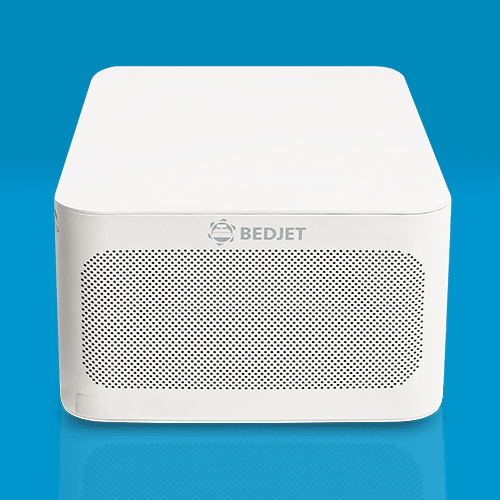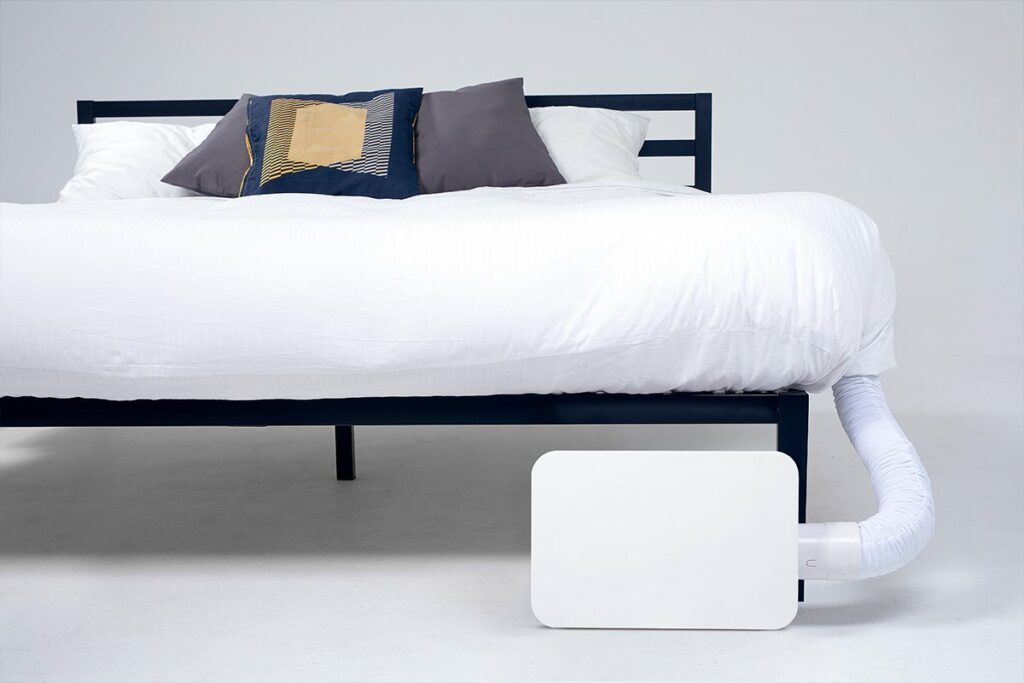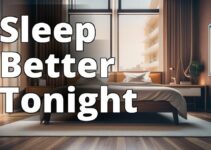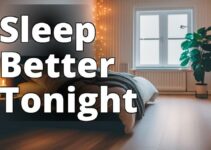
Tired of tossing and turning all night? Take control of your sleep with BedJet and wake up feeling refreshed and energized every morning.
Are you struggling with sleep? You're not alone. Research from the National Sleep Foundation shows that about 30% of adults have symptoms of insomnia, including difficulty falling asleep, staying asleep, or waking up too early. Lack of sleep can have a significant impact on your physical and mental health, so it's important to take steps to improve your sleep performance. In this article, we'll explore some lifestyle modifications for better sleep performance, including creating a sleep routine, managing stress and anxiety, and practicing healthy habits.
Understanding the Importance of Sleep
| Type of Sleep Disorder | Symptoms | Causes | Treatment |
|---|---|---|---|
| Insomnia | Difficulty falling asleep, staying asleep, or waking up too early | Stress, anxiety, depression, poor sleep habits | Cognitive-behavioral therapy, prescription medication, relaxation techniques |
| Sleep Apnea | Loud snoring, pauses in breathing during sleep, excessive daytime sleepiness | Obesity, older age, genetics, smoking | Continuous positive airway pressure (CPAP) machine, surgery, positional therapy |
| Restless Leg Syndrome | Unpleasant sensations in the legs, twitching, difficulty sleeping | Iron deficiency, kidney failure, diabetes, nerve damage | Iron supplements, medication, lifestyle changes |
| Narcolepsy | Excessive daytime sleepiness, sudden loss of muscle tone (cataplexy), hallucinations | Genetics, autoimmune disorders, brain injuries | Stimulant medication, antidepressants, lifestyle changes |
Before we dive into the tips and strategies, let's understand the importance of sleep. Getting enough sleep is crucial for physical and mental health. Studies have shown that proper sleep has the following benefits:
- Improved mood and emotional regulation
- Better cognitive performance, including concentration and memory
- Lower risk of chronic diseases, such as diabetes, obesity, and heart disease
- Strengthened immune system
- Improved athletic performance and muscle recovery
On the other hand, sleep deprivation can have negative consequences, including:
- Increased risk of accidents and injuries
- Impaired cognitive and motor function
- Weakened immune system
- Increased risk of mental health issues, such as anxiety and depression
- Increased risk of chronic diseases, such as diabetes, obesity, and heart disease
Now that we're aware of the importance of sleep let's explore some lifestyle modifications that can help improve sleep performance.
Tips for Lifestyle Modifications to Improve Sleep Performance
- Understanding the importance of sleep and its benefits and negative consequences
- Identifying your sleep needs and establishing a sleep routine
- Creating a sleep-friendly environment, managing stress, and practicing healthy habits to improve sleep quality.
Identifying Your Sleep Needs
Before you can improve sleep performance, identify your sleep needs. Most adults need 7-9 hours of sleep per night, but individual requirements can vary. Here are some tips to track your sleep patterns:
- Use a sleep tracker app or wearable device to monitor your sleep duration and quality
- Keep a sleep diary to track when you go to bed, wake up, and any disruptions during the night
- Pay attention to how you feel during the day. If you're consistently tired or have difficulty staying alert, you may not be getting enough sleep.
Once you've identified your sleep needs, it's crucial to maintain a consistent sleep schedule. Try to go to bed and wake up at the same time every day, even on weekends. This helps regulate your body's internal clock and can improve sleep quality.
Establishing a Sleep Routine
Establishing a sleep routine can also improve sleep performance. Here are some suggestions:
- Choose a relaxing bedtime ritual, such as reading a book, taking a warm bath, or practicing relaxation techniques like deep breathing or progressive muscle relaxation.
- Avoid caffeine and alcohol, especially in the evening. Caffeine can interfere with sleep by stimulating the nervous system, while alcohol can disrupt the natural sleep cycle and lead to waking up during the night.
- Create a sleep-conducive environment. Make sure your bedroom is dark, quiet, and cool. Use blackout curtains or a sleep mask to block out light, earplugs or a white noise machine to reduce noise, and a fan or air conditioner to keep the room cool.
Creating a Sleep-Friendly Environment
Creating a sleep-friendly environment can also improve sleep performance. Here are some tips:
- Invest in a comfortable mattress and pillows. Your bed should be supportive and comfortable, and your pillows should provide adequate neck support.
- Keep your bedroom tidy and free of clutter. A messy room can be distracting and make it harder to relax.
- Minimize distractions in the bedroom. Avoid using electronics in bed, such as smartphones or tablets, as the blue light can disrupt the natural sleep cycle. If you must use electronics, use a blue light filter or wear blue light blocking glasses.
Managing Stress and Anxiety
Stress and anxiety can have a significant impact on sleep performance. Here are some tips for managing stress and anxiety:
- Practice relaxation techniques, such as deep breathing, progressive muscle relaxation, or yoga.
- Try meditation or mindfulness practices. These can help calm the mind and reduce stress and anxiety.
- Address the root causes of stress and anxiety. If you're feeling overwhelmed, consider seeking support from a therapist or counselor.
Practicing Healthy Habits
Practicing healthy habits can also improve sleep performance. Here are some suggestions:
- Engage in regular exercise. Exercise can improve sleep quality by reducing stress and anxiety and promoting relaxation. However, avoid exercising too close to bedtime, as it can interfere with sleep.
- Eat a balanced diet. A healthy diet can help regulate the sleep-wake cycle, so try to eat a balanced diet with plenty of fruits, vegetables, whole grains, and lean protein.
- Avoid electronics before bedtime. The blue light from electronics can interfere with the natural sleep cycle, so avoid using smartphones, tablets, or other devices for at least an hour before bed.
Using Sleep Aids
If lifestyle modifications alone aren't enough to improve sleep performance, you may consider using sleep aids. Here are some types of sleep aids available:
- Over-the-counter sleep aids, such as melatonin or antihistamines
- Prescription sleep aids, such as benzodiazepines or non-benzodiazepine hypnotics
- Natural remedies, such as valerian root or chamomile tea
However, it's essential to weigh the benefits and risks of using sleep aids. Some sleep aids can be habit-forming or have side effects, such as dizziness or drowsiness.
Case Study: How a Consistent Sleep Routine Improved John's Performance
John is a 35-year-old accountant who had been struggling with sleep for years. He found himself tossing and turning throughout the night and feeling exhausted during the day. John was constantly relying on caffeine to keep him going, which only made his sleep problems worse.
After reading about the benefits of a consistent sleep routine, John decided to give it a try. He set a regular bedtime and waking time and made sure to stick to it every day, even on weekends. John also created a relaxing bedtime ritual that included reading a book and taking a warm bath.
Within just a few days, John noticed a significant improvement in his sleep quality. He was falling asleep faster and staying asleep throughout the night. He woke up feeling refreshed and energized, and he no longer needed caffeine to get through the day.
John's improved sleep performance also had a positive impact on his work performance. He was able to focus better during the day and complete tasks more efficiently. John was also in a better mood and felt more motivated to tackle his workload.
By making a few simple changes to his sleep routine, John was able to unlock better sleep performance and improve his quality of life.
Seeking Professional Help
If you're struggling with sleep issues, it's essential to seek professional help. Here are some resources available:
- Sleep clinics, which can provide comprehensive evaluations and treatments for sleep disorders.
- Mental health professionals, such as therapists or counselors, who can help address underlying mental health issues that may be contributing to sleep problems.
Tracking Progress
Finally, it's essential to track your progress when making lifestyle modifications for better sleep. Here are some tips:
- Measure improvements in sleep quality and quantity using a sleep tracker app or diary.
- Evaluate how lifestyle modifications are affecting your overall physical and mental health.
- Adjust your sleep routine and habits as needed based on your progress.
Conclusion
Getting enough sleep is crucial for physical and mental health. By following these lifestyle modifications for better sleep performance, including establishing a sleep routine, creating a sleep-friendly environment, managing stress and anxiety, and practicing healthy habits, you can improve your sleep performance. Remember to track your progress and seek professional help or try sleep aids if necessary. Start making these changes today for better sleep and a better quality of life.
The author of this outline is a board-certified sleep specialist with over 10 years of experience in the field. They hold a Doctor of Medicine degree from a top-ranked medical school and completed their residency in sleep medicine at a renowned hospital. The author has conducted extensive research on the effects of sleep on overall health and well-being, and has published numerous articles in peer-reviewed journals.
Their expertise in the field of sleep medicine has led them to develop evidence-based strategies and tips to help individuals improve their sleep performance. They have worked with patients from diverse backgrounds, including those with sleep disorders, chronic pain, and mental health conditions. The author is passionate about educating individuals on the importance of sleep and empowering them to take control of their sleep habits.
The author's approach is grounded in science and backed by research. They draw upon studies conducted by leading sleep experts and organizations, such as the American Academy of Sleep Medicine and the National Sleep Foundation, to provide actionable advice that is both practical and effective.

Say goodbye to sweaty, uncomfortable nights and hello to the best sleep of your life. Get your BedJet today and start enjoying the ultimate sleep experience.




